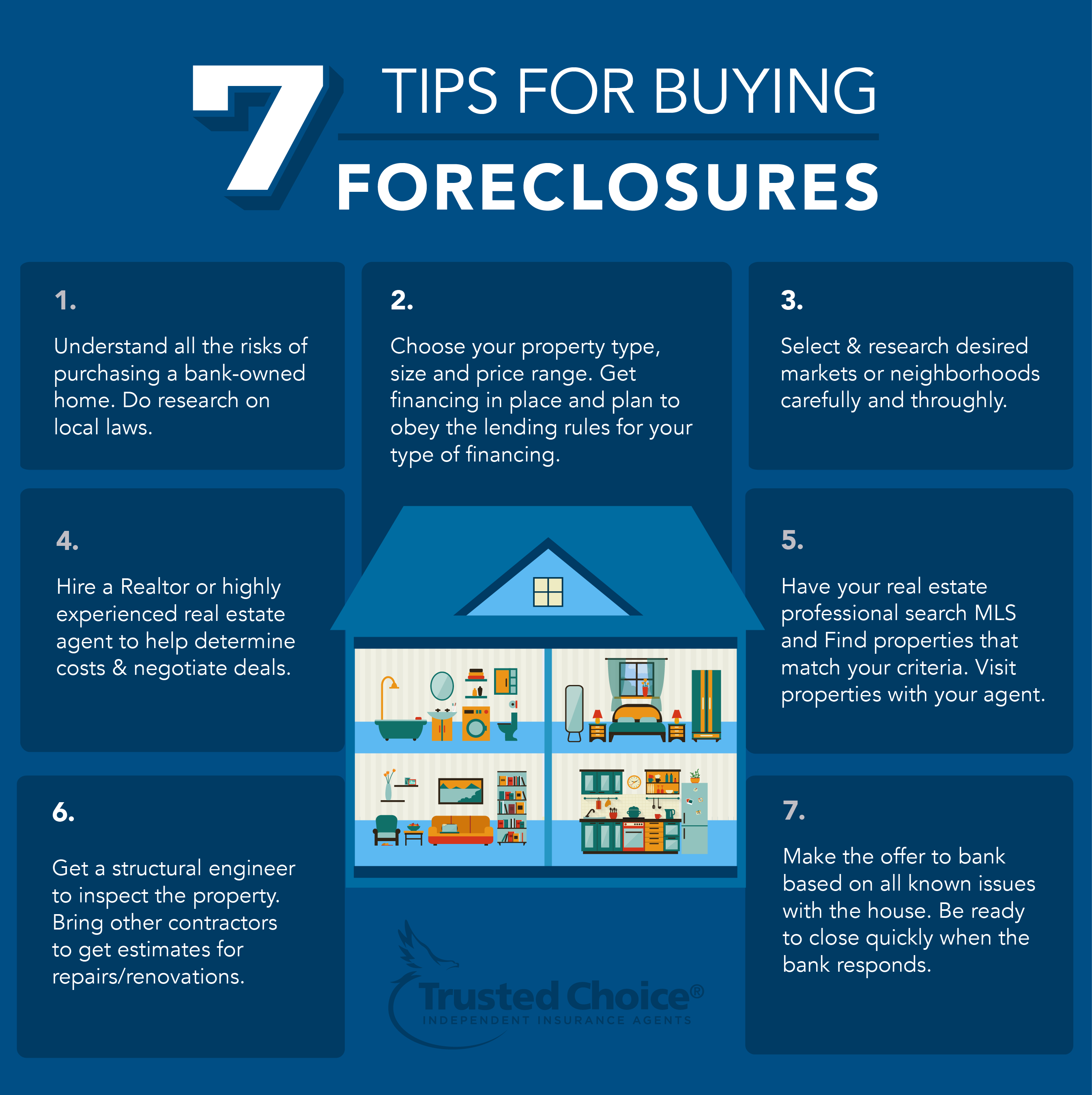How to Find and Purchase Foreclosed Homes the Right Way

You’ve probably heard that foreclosures and bank-owned homes are a quick way to get a great home well below market price. That’s true. Often, however, it’s challenging to buy foreclosures, especially if you’re not experienced.
That doesn’t mean it’s impossible—you can get some exceptional deals. But you must know what you’re doing when investing in a foreclosure for it to make financial sense. Here are some things to keep in mind when contemplating purchasing a bank-owned home as a primary residence or investment property.
Foreclosures Are Easy to Find but Hard to Acquire for Novices
From listing sites or apps like Trulia and Zillow to MLS, foreclosures are relatively easy to find. But even if you identify foreclosures of interest, acquiring them is hard, especially for novice buyers.
Experienced real estate investors like Bruce Ailion of The Ailion Team of Atlanta, GA, recommend choosing the right real estate professionals, in particular, realtors, to help. That’s critical to successfully buying foreclosures.
Find someone who specializes in these transactions, who also knows the area where you’re buying and what a good listing would look like for you. Ailion, who has sold 2,500 foreclosures and purchased about 150, says, “This, more than any other area, is where hands-on experience is important. Hire an agent with substantial knowledge of and experience with foreclosures.”
And also avoid list purveyors on the internet, says Ailion. “Be wary of a promoter or agent offering unlisted, quiet listings or off market properties,” he asserts. “People can be misled into believing that secret, private, exclusive, nonpublic information is the key to getting a bargain,” he continues. That may be true, but only within networks you trust, not from unknown private-list purveyors who are selling the information elsewhere. “The person seeking to lure you with secret, private, non-public info is more likely fleecing you than providing you with a great bargain,” Ailion concludes.
Kyle Alfriend, realtor and lead agent for Alfriend Group in Dublin, OH, agrees. “A list will get you running all over town into unknown areas and you’ll make buying mistakes.” Instead, Alfriend strongly recommends choosing a single neighborhood if you’re a residential buyer, a market if you’re an investor, or using an investor’s buying strategy and choosing foreclosures there. “Decide your price point and learn that part thoroughly,” declares Alfriend, who has bought and sold 126 homes, lived in 18 of them and represented buyers and investors in over 1,500 home-buying transactions in the past 26 years. “By knowing your market, you’ll typically know what’s going on with property there and make better buying choices.”
There’s one strategy neither expert advises consumer buyers or most investors to try: buying from sheriff’s sales or courthouse auctions. That’s because you must be willing to buy the house as is, with no inspection or even entering the home before sale, and all liens are conveyed with the sale. You could “win” a disaster at auction.
This strategy should be used only by absolute experts who know the home’s market (so are familiar with the home, its defects and the ownership history) or by banks, which win these auctions most of the time, according to Alfriend. He says, “It takes about 100 hours to research a house for auction carefully enough to know all of its issues before bidding. But if you already know the market thoroughly, you’ll probably already know that house.”
Finally, says Ailion, most banks won’t sell directly to buyers so you should not call one directly. “Banks are businesses. They buy the homes from professionals, and they expect to negotiate with professionals at sale,” he explains. Alfriend says banks will tell you how many offers are on a property but not what they are. So let your realtor deal with the bank.

Know that Buying Foreclosure Is All Business
Since you’re avoiding auctions and sheriff’s sales (except as educational opportunities), you’ll buy the house once the bank has purchased it at auction. Then you’ll have your realtor call the bank and conduct the offer process.
Alfriend says to remember that banks are not individual sellers and are not in the property management business. Banks, especially multinationals, are primarily profit-driven. Selling foreclosures is about the numbers—recouping as much of their investment as possible. Don’t expect any emotion to be involved in negotiations. Know your own numbers and have your lowest and highest offers set before going ahead and making the offer.
“Banks just want to make the deal. For them, it’s about getting their absolute rock bottom sales price and, once they respond to your offer, getting cash on the table and closing as fast as humanly possible. That often means closing with no contingencies like inspections or securing financing,” Alfriend explains.
Cash buyers have an advantage over those paying with mortgages, which delay closing times. Ailion adds, “Conventional buyers are competing with investors who can make fast cash deals, which makes it harder for them to buy bank-owned properties.”
Alfriend recommends that if you’re dealing with a big bank, you have cash financing in place, if possible. “Get a home equity line of credit or a private loan before making the offer, then refinance that into a conventional mortgage if you don’t intend to flip it,” he says.
Other Risks and Rewards of Buying Foreclosures
Bank-owned property purchases come with additional risks not common in conventional home deals. Each jurisdiction has different foreclosure laws that can affect your transaction. “In some states,” says Ailion, “a borrower can redeem a home after foreclosure.”
Also, know that there are different lending rules for buying homes directly from HUD, VA or FHA, especially if you’re an investor, and breaking them subjects you to prosecution for fraud. Make sure a home you’re eying isn’t subject to borrower redemption and ask your realtor or attorney about other state laws or agency rules that may influence the legality of your transaction.
Moreover, dealing with banks as sellers is legally different than with individual homeowners. With a conventional home purchase, you’re dealing with individuals and, usually, their licensed real estate agents. That means that, by law, they must disclose any known issues with the property at the time of the offer. Banks, on the other hand, have no such legal obligation.
“Because the bank is not a seller who has occupied the house, the bank is exempt from the rule,” explains Alfriend. In fact, they may not have entered the home until well after purchase, if at all. Additionally, if you find defects after making an offer, the bank will often not renegotiate the offer based on that discovery. Your offer should take into account all of the home’s shortcomings. Foreclosures are usually sold as is and, frequently, there’s no inspection after you make an offer to a bank.
Alfriend says that’s why it’s important not only to get a thorough inspection before making the offer, but also to have a structural engineer conduct it and call in any contractors as necessary to evaluate the cost of repairs.
“Walk into a foreclosure assuming there will be a ton of repairs and damage to fix. Not only might there be enormous disrepair, but also potentially major vandalism,” he explains. Size, layout, location and major environmental issues should be identified as well, Ailion says. “There is usually a reason you are getting a discount, and that may not become apparent until after you own the home,” he adds.
So while a structural engineer’s fee is three times that of a home inspector, they will see what a home inspector won’t and can save you an enormous amount of money or the heartache of investing in a disastrous foreclosure. After this process, make your offer to the bank, taking into account rectifying the home’s issues.
Another risk residential buyers face when purchasing foreclosures is that while you must be prepared to act fast once a bank responds to your offer, the time between your offer and that response can be lengthy. Unlike a conventional resale transaction, “Banks can be slow to act and don’t make rational decisions,” says Ailion.
It’s not uncommon to wait weeks or months for a response. If you’re a residential buyer, be ready for the wait. Your offer is as likely to be rejected as accepted. You could lose in a bidding war or to another buyer after months of waiting. Be prepared to start your search again.
There are ways to circumvent some offer-related risks and gain an advantage over big bank transactions by working with community banks or credit unions. Like other institutions, they want properties off their books quickly at the best price, but may be more willing to negotiate. “The smaller the bank, the more likely you can get better pricing and special financing,” explains Alfriend.
Also, municipalities, particularly in revitalizing areas, may offer special deals like lower interest rates, rock-bottom prices, and down payment assistance. Again, know and abide by program rules to avoid fraud penalties.
Another advantage of buying a foreclosure is that you don’t have to deal with seller contingencies like negotiating move-out dates or protracted price negotiations. Not only can you get the home at a deep discount, it will be empty. The bank will also convey the property free of liens and with a clean title.
This process isn’t for everyone. But if you have the fortitude, patience and resources to invest in a foreclosure, you can obtain an outstanding property at an excellent price, build in equity by doing repairs, and benefit substantially at resale. Use these tips as your starting point.
